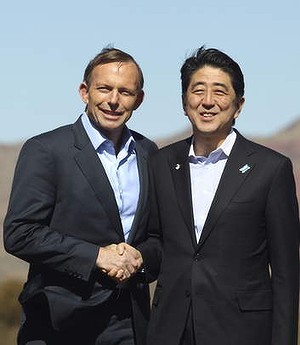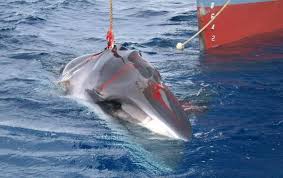After meeting with Prime Minister Tony Abbott, Shinzo Abe has announced that Japan would abide by the International Court of Justice ruling. In a carefully worded statement, Abe said “based on this, Japan will engage in research on whaling to protect the indispensable scientific information [we need] to manage the whale resources.”
Paul Watson of Sea Shepherd, a conservation group that have long opposed Japan’s so called whale ‘research’, said that he expected Japan to try to get around the ruling of the ICJ and start a new ‘scientific’ whaling programme. Abe’s statement certainly reflects the idea that Japan will begin another hunt for whales in 2015. Peter Whish-Wilson, a Green senator, handed a letter from Sea Shepherd, warning against starting a new programme to Shinzo Abe.

Abbott refused to address the issue, citing that the friendship between Japan and Australia was “far far bigger than our disagreement on one particular subject”. Abbott stated that Japan should receive “great credit” for respecting the ICJ decision even though Japan confirmed that it would be conducting ‘research’ whaling next year. John Key, Prime Minister of New Zealand, spoke to Abe earlier in the week and said “the prime minister [of Japan] did make it clear that they are looking at what sort of whaling program, in theory, could be conducted that fits within the rules.” It was made clear that New Zealand wants to end the whaling.

“This is just commercial whaling in disguise and the Australian Greens are calling on Tony Abbott to make an absolute end to whaling and new co-operation in non-lethal research a top priority today in his discussions with PM Abe, ” said Whish-Wilson, who also claimed that the Abbott had done little about whaling since being elected. It was the previous labour government who took Japan to the ICJ on the subject on whaling and since then, there has been little involvement with the issue by the current government.
“For 10 years Japan has been calling us eco-terrorists and bandits and militants. Well the tables are turned: they’re the ones who are the criminals and we’re simply upholding international conservation law,” Mr Watson told ABC radio.
“The ICJ judgment was damning over the lack of science and the fact Japan hasn’t looked at non-lethal ways of collecting research on whales. With the methods we now have to study whales, it’s a fallacy to say you have to kill them to study them,” said Darren Kindleysides, director of the Australian Marine Conservation Society.

The whaling is senseless, even in the face of tradition. The young of Japan is rejecting whale meat, especially after findings that 2.28bn yen (£18.5m) from the recovery fund was used after the 11th March earthquake, to pay for the Antarctic hunt that year.
Yoshimasa Hayashi, Japan’s fisheries minister has stated that “In Australia they eat kangaroos. We don’t eat those animals, but we don’t stop them from doing that because we understand that’s their culture.” Overfishing in Australia has depleted many fish stocks and Western Australia introduced a shark baiting and killing program, strongly opposed by scientists, which killed 172 sharks in just 13 weeks. Japan does have a point, there is hypocrisy in this argument. However, the kangaroos are not in anyway endangered. They are listed as ‘of least concern’ whereas the whales are still trying to recover from the decimation of their populations after international commercial whaling. Whaling cannot be condoned, but there does need to be some change in the countries who are calling Japan to cease their whaling.
There is the potential that Japan may pull out of the International Whaling Commission by the end of the year, meaning that they would be free next near to continue whaling, as they wouldn’t be bound by the ban on commercial hunting. If Japan does this, there is little that can be done to stop their whaling programmes.
The ICJ’s ruling should have stopped the Japanese and it is sad to see that they are trying to get around the rules. There is no ‘scientific’ research for whales that requires them to be killed as the numerous documents from the long-term commercial whaling that was carried out before the 1980s provided a multitude of information and with the declining popularity for whale meat, the whaling should have stopped as soon as the ICJ ruled so.
Shame on both the Australian and Japanese governments, short sighted and self serving. An opportunity missed, let’s see if there is any sort of an international response to this. Great post.